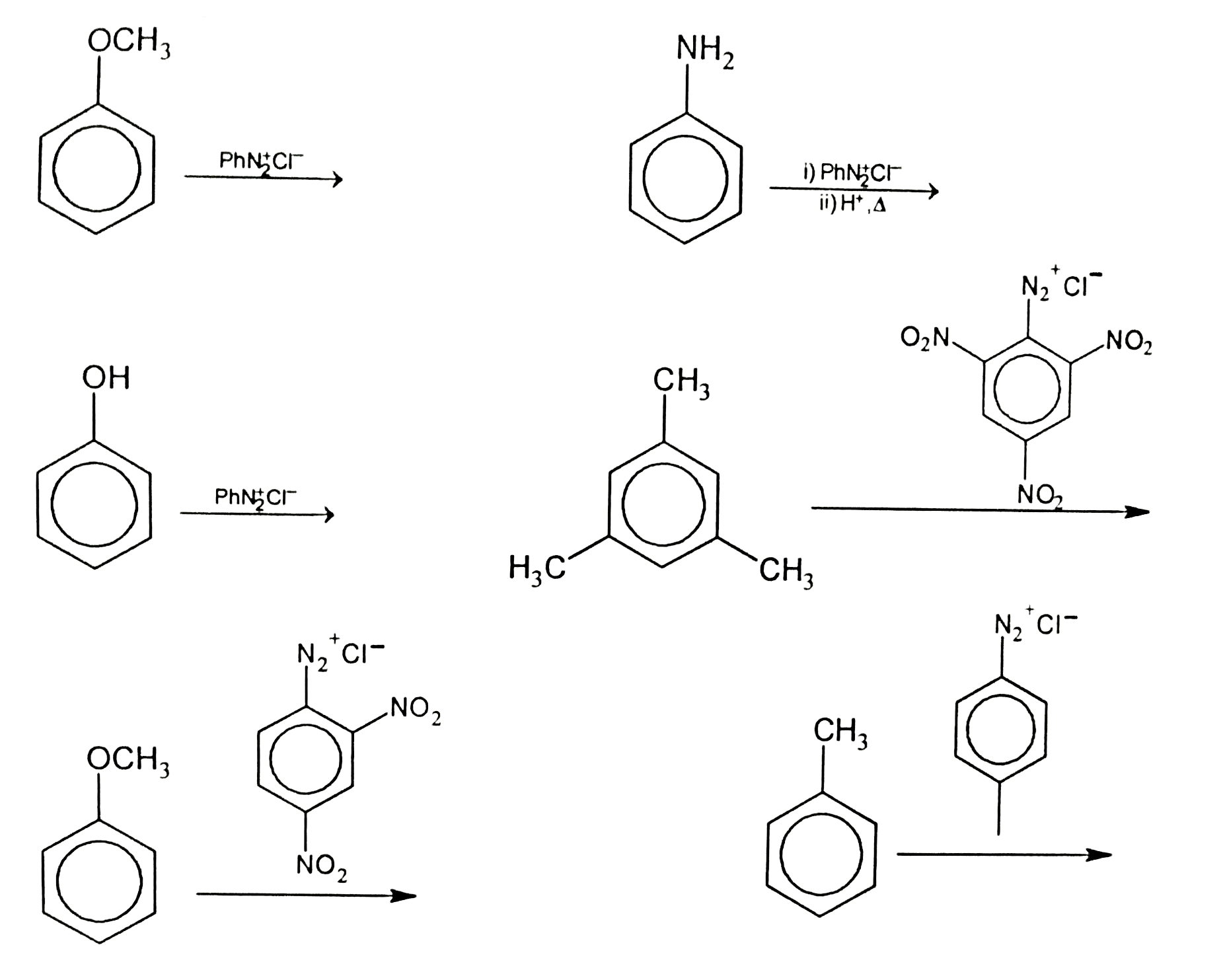Aniline does not give coupling reactions at pH <5 because :
Diazonium salt converts into C6H5−N=N−Cl which cannot couple
Aniline coverts into C6H5⊕NH3Cl− , which cannot couple
both (1) and (2 ) .
Coupling only takes place in basic medium .
The correct Answer is:B
To solve the question of why aniline does not give coupling reactions at pH less than 5, we can follow these steps:
Step 1: Understand the nature of aniline
Aniline is an aromatic amine with the formula C6H5NH2. It has a lone pair of electrons on the nitrogen atom, which makes it a good nucleophile.
Hint: Remember that nucleophiles are species that donate an electron pair to form a chemical bond.
Step 2: Analyze the effect of pH on aniline
At pH less than 5, the environment is acidic. In acidic conditions, aniline can accept a proton (H+) from the surrounding medium, leading to the formation of anilinium ion (C6H5NH3+).
Hint: Consider how acids and bases interact; acids donate protons, while bases accept them.
Step 3: Formation of anilinium ion
The reaction of aniline with protons can be represented as:
C6H5NH2+H+→C6H5NH3+
The resulting anilinium ion (C6H5NH3+) is positively charged and has a different electronic structure compared to neutral aniline.
Hint: Think about how charge affects the ability of a molecule to act as a nucleophile.
Step 4: Nucleophilicity of anilinium ion
The anilinium ion is not a nucleophile because the positive charge on the nitrogen atom makes it less likely to donate its lone pair of electrons. As a result, it cannot participate in coupling reactions with diazonium salts.
Hint: Recall that nucleophiles are typically neutral or negatively charged; a positive charge can inhibit nucleophilic behavior.
Step 5: Conclusion
Since the anilinium ion cannot act as a nucleophile, it cannot couple with diazonium salts under acidic conditions (pH < 5). Therefore, aniline does not undergo coupling reactions in such conditions.
Final Answer: Aniline does not give coupling reactions at pH less than 5 because it forms anilinium ion, which is not a nucleophile and cannot couple with diazonium salts.
---
Aniline is an aromatic amine with the formula C6H5NH2. It has a lone pair of electrons on the nitrogen atom, which makes it a good nucleophile.
At pH less than 5, the environment is acidic. In acidic conditions, aniline can accept a proton (H+) from the surrounding medium, leading to the formation of anilinium ion (C6H5NH3+).
The reaction of aniline with protons can be represented as:
C6H5NH2+H+→C6H5NH3+
The resulting anilinium ion (C6H5NH3+) is positively charged and has a different electronic structure compared to neutral aniline.
The anilinium ion is not a nucleophile because the positive charge on the nitrogen atom makes it less likely to donate its lone pair of electrons. As a result, it cannot participate in coupling reactions with diazonium salts.
Since the anilinium ion cannot act as a nucleophile, it cannot couple with diazonium salts under acidic conditions (pH < 5). Therefore, aniline does not undergo coupling reactions in such conditions.
Similar Questions
Knowledge Check
Aniline on nitration gives
Ao-nitroanilineBp-nitronanilineCm-nitroanilineDmixture of o,m,p-nitronailineAniline on nitration gives
A B
B C
C DAll of these
DAll of theseAn aniline on nitration gives
A B
B C
C DBoth a and c
DBoth a and c
Proteins does not give reaction with
View SolutionGlucose gives many reactions of aldehyde, because
View SolutionBenzene contains double bonds but does not give addition reactions because
View SolutionChlorobenzene does not give SN1 reaction, because of
View SolutionAssertion: Aniline does not undergo Friedel Crafts reaction.
Reason : Friedel Crafts reaction is an electrophilic substiution reaction.
View Solution

